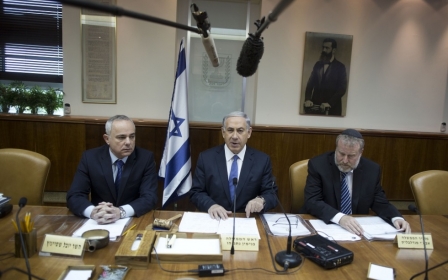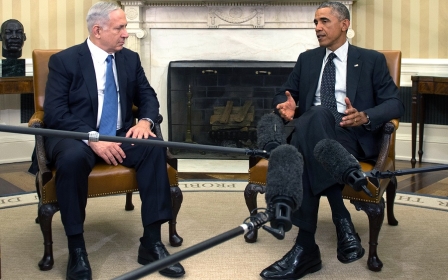ANALYSIS: Is pro-Israel money changing right-wing US politics?

NEW YORK - There is no shortage of theories about Zionist conspiracies and Israel’s ability to influence its mighty ally, the United States; but whether these amount to anti-Semitic bunkum or a pertinent analysis of Jewish-American money steering US politics remains hotly contested.
That debate moved forward over the weekend when The New York Times detailed a “surge” in financial support from pro-Israel billionaires to Republican lawmakers who - like Israeli Prime Minister Benjamin Netanyahu - are vehemently opposed to a proposed deal on curbing Iran’s atomic programme.
The newspaper highlighted Tom Cotton, the Arkansas senator who signed a letter with 46 Republican colleagues denouncing the planned Iran deal, which trades sanctions relief for safeguards on its nuclear activities, and suggested a link to growing pro-Israel funding in right-wing US politics.
There is doubtless some truth to these claims. An obvious starting point is Sheldon Adelson, the Jewish-American casino tycoon who has called for a US nuclear strike on Iran and lavished more than $100mn on Mitt Romney’s failed bid to claim the White House in 2012.
The Center for Responsive Politics tracks money in US politics via lobbying, the political action committees (PACs) that fund candidates’ campaigns but are capped, and the so-called super PACs of unlimited donations from individuals, groups and firms, which can only fund specific items, such as television adverts, rather than candidates.
In the 2014 election cycle, pro-Israel funders spent $11.6mn on politicians - including $8.6mn from individuals and $2.9mn from PACs. It followed a longstanding Democrat bias for pro-Israel funding, with 56 percent destined for Democrats and 44 percent to Republicans.
This marked a shift towards the Republicans from previous cycles, such as 2010, when pro-Israel groups spent $13.3mn - $9.9mn from individuals and $3.2mn from PACs - of which 63 percent went to Democrats and 35 percent to Republicans.
In the 2014 cycle, the largest PAC was J Street, a liberal pro-Israel group that spent $1.8mn almost exclusively on Democrat candidates. The second biggest, NorPAC spent $815,000 split roughly evenly between Democrats and Republicans.
At the same time, the American Israel Public Affairs Committee (AIPAC), a more hawkish pro-Israel group which, despite its name, is not a PAC, spent $3.1mn lobbying the government, compared to the $400,000 spent by the second biggest pro-Israel lobby group, J Street.
According to Josh Ruebner, a policy expert at the US Campaign to End the Israeli Occupation, a pressure group, pro-Israel funding is swinging to right-wing US politics as Democrats increasingly question a party tradition of wholesale support for Israel.
“The hundreds of thousands donated by the PACs are just the tip of the iceberg; the unlimited contributions of Adelson and other pro-Israel individuals through super PACs are more influential and, on the whole, more murky and opaque,” Ruebner told Middle East Eye.
“And of course it affects policy. Let's not pretend it’s about values, priorities or ethics. It’s about whose buttering their bread and getting a candidate to the point where they can be elected. This is exactly how the US political system operates.”
Jamal Abdi, a policy director at the National Iranian American Council, notes strengthening bonds between right-wingers and hawkish Israelis that was showcased by Netanyahu denouncing the Iran deal in Congress in March at the invitation of Republicans and without White House approval.
“There is a trend of high-power Republican pro-Israel donors pouring money into certain candidates that has provided a bizarre incentive structure where the Tom Cottons are being rewarded for blowing things up with no idea what the consequences are,” Abdi told MEE.
“There is a broader gambit by Republicans to make inroads with pro-Israel organisations like AIPAC that have historically been closer to Democrats, and to exploit this split between a Democratic president and some major pro-Israel funders to gain more support for Republicans.”
Others disagree. Daniel Kalik, a J Street analyst who oversees JStreetPAC, the largest pro-Israel PAC in the US, said Jewish Americans overwhelmingly disagree with Netanyahu, eschew war in the Middle East and want a negotiated settlement with Iran.
“There’s deep and meaningful support from Jewish Americans who care about Israel for candidates who are willing to take a more pro-diplomacy, pro-two-state solution, nuanced view of what is the best policy for the US, Israel and in the broader interests of the Middle East,” he told MEE.
According to Pew Research Center, some 70 percent of Jewish Americans were Democrats and 22 per cent were Republicans in 2013. That balance tilted among the smaller proportion of Orthodox Jews, of which 57 percent were Republican and 36 per cent were Democrats.
Dylan Williams, another J Street analyst, said that hostility among Republicans to the framework Iran deal being promoted by US President Barack Obama could not be wholly explained by more political cash from hawkish pro-Israel billionaires.
“It’s not just about conservative, pro-Israel money. It’s also about right-wingers undermining and caricaturing President Obama and conservative Republicans staking out the most right-wing position possible in a primary election season. That position is occupied by Netanyahu,” he told MEE.
“At the same time, they obviously also see some fundraising benefit in appealing to the very small handful of hawks in the Jewish-American community who make outsized donations to those who parrot extreme right-wing positions.”
Ruebner, author of Shattered Hopes: Obama’s Failure to Broker Israeli-Palestinian Peace, also questioned whether Republican hostility to the Iran deal results from pro-Netanyahu funders or sincere fears over whether Iran will ditch its nuclear aspirations.
“It’s hard to find the dividing line between this as a partisan attack on Obama, the monetary component and a general right-wing, Republican tendency to favour the use of military force. It’s all interlocking and self-reinforcing,” he told MEE.
Senator Bob Corker, the Republican chairman of the Senate Foreign Relations Committee, has expressed concerns about the deal and announced plans to vote on 14 April on legislation requiring Obama to submit a final nuclear agreement to Congress for review and approval.
For George Perkovich, an Iran expert at the Carnegie Endowment for International Peace, a think tank, the framework Iran deal is so much better than the alternatives - war or returning to sanctions - that hard-line Republicans will ultimately modify their position, regardless of campaign funding.
“If the agreement as outlined … is seen widely as positive, which I think it will be, for the Republicans to act early and sabotage a promising diplomatic process would leave them solely responsible in the eyes of the entire world, and that’s not a good position politically for either the Republicans or the country,” he told MEE.
Likewise for Abdi, another supporter of negotiations with Iran, Netanyahu, hard-line Republicans and other naysayers will ultimately be drowned out by public opinion despite the increased spending of hawkish pro-Israel campaign funders.
“It’s going to be much harder for the agenda of the Sheldon Adelsons and the AIPACs to hold sway in Congress. There’s been a backlash to the Cotton letter and the Netanyahu invite that has made it near-impossible for a veto-proof majority to materialise and undermine the president,” he told MEE.
“So it becomes a lot more symbolic and rhetorical in actual practical opposition to any Iran deal; it has been self-defeating.”
Stay informed with MEE's newsletters
Sign up to get the latest alerts, insights and analysis, starting with Turkey Unpacked
Middle East Eye delivers independent and unrivalled coverage and analysis of the Middle East, North Africa and beyond. To learn more about republishing this content and the associated fees, please fill out this form. More about MEE can be found here.




